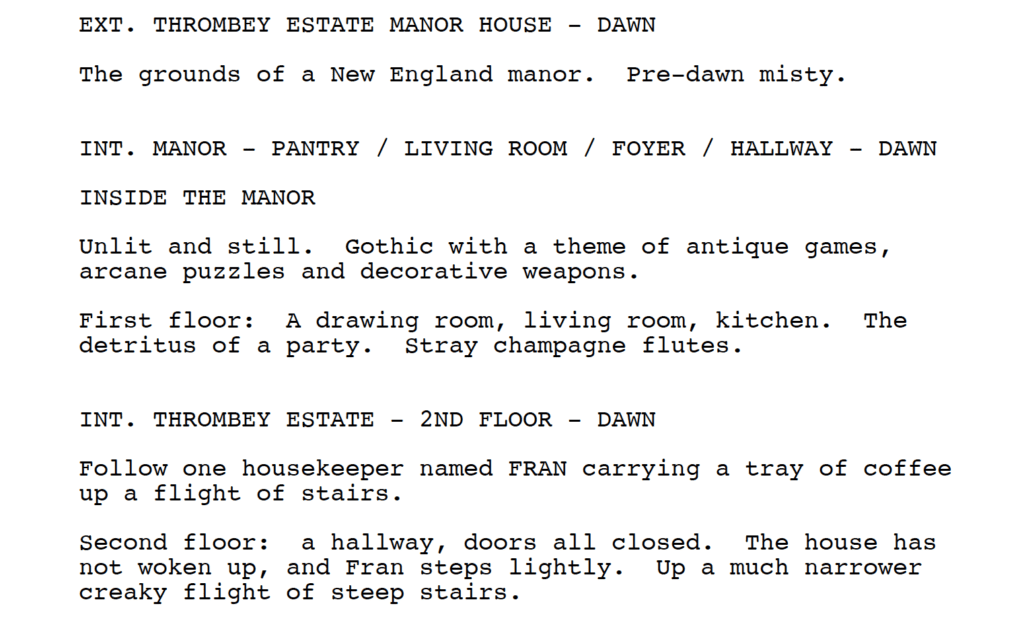In the last blog post, we discussed what to read and how it helps you become a better screenwriter. Now, we look at the next step in the journey, which is simply: writing! But, again, we're interested in knowing what to write and how it helps us grow. So, let's discuss...
WRITING
Naturally, getting better at anything in life takes time, effort, and proper technique. So, when it comes to writing, there are different exercises we can do - which take time and effort - that can provide us with the proper technique to propel us toward the goal of writing our own incredible scripts.
The first exercise is copying a professional screenplay word-for-word. For example, if you're reading the script for Knives Out, also open your screenwriting software (Final Draft, Celtx, etc.) and write out exactly what you read in the original script:

This exercise is almost like being a co-pilot on a passenger jet. If you've ever taken a peak in the cockpit, there are typically two yokes (a.k.a. steering wheels). As the pilot turns his yoke, it also turns the co-pilot's. If the pilot turns right and the co-pilot has his hands on the yoke as well, he can feel the steering wheel turning, allowing him to get a feel for how the pilot is flying the plane. That same idea is happening here: as you copy your favorite writers, you get a feel for how they create their scripts, which helps you understand screenwriting elements such as voice, tone, pacing, dialogue, and act structure.
The next exercise is writing the script for a film/episode as you're watching it. For example, watch the pilot for Stranger Things and write the opening scene as you see it unfold: the superimposed title against the night sky, the strange sounds, the camera's tilt down toward the laboratory, the movement through the eerie corridor...all the way through to the end.
Then, take your work and compare it to the actual script for the show. How did you do? Were there things they described that you left out? Vice-versa? How did you describe the scientist and his actions? Does the show's tone bleed through your writing? This exercise builds on the last by helping you think like the original writers as you try to replicate what they have created. Here, you really get to emphasize your own voice, while still learning more about each of the other screenwriting elements listed in the previous exercise.
(Note: One thing you may notice is the film/episode might deviate from the scene descriptions or storyline in the original screenplay, so your work may be a little different when you go to compare your own version with the original. We were copying in the previous exercise, but we're reverse engineering in this one, so it may not match up perfectly.)
The next exercise is writing a "spec script" (short for "speculative screenplay"). There are two variations of spec scripts. One refers to a script comprised of material completely original to you, with the hopes of ultimately selling it to a studio. The other type refers to a script that could fit into an existing series or film franchise - for instance, you create your own episode of SpongeBob or the next Toy Story movie. It is this second meaning that we're referring to here.
Writing a spec script builds on the previous exercise by allowing you to be totally creative in a controlled environment - given that most of the heavy lifting is already done for us. You don't have to create the characters from scratch, the world is already established, the structure is typically the same in every episode, and the tone is generally consistent. The tasks for you in this exercise are: replicating the characters' personalities and subsequent actions, reproducing the same act structure (i.e. Teaser, 3 or 5 Acts, etc.), developing believable storylines, and delivering a satisfying theme. How does this help? The original film/show is both a guide and a standard. Therefore, you can see how to replicate excellent writing, and you can tell when you meet that standard. If the characters are accurately recreated, there are engaging plot lines, the structure is well-formatted, your voice shines on the pages, and a strong theme is nicely delivered, then you know your script can fit well into the franchise - which is pro-level stuff - and you are well on your way to leveling up as a writer!
The final exercise to grow your skills is completing writing prompts. (Lists can be found at No Film School and ScreenCraft.) Simply take a prompt that stands out to you and write a story. This exercise largely gives you free reign over the material, with at least one or two helps along the way. For instance, a prompt might say, "A group of astronauts on a mission to Mars must confront unexpected challenges and danger." Some of the leg work is done for you: the main characters are astronauts and they must survive their mission to Mars - but the rest is up to you. You decide the how the plot plays out, what the characters are like, how many characters there are, the type of genre, and what the theme is.
Repetition is key, so it's best to complete these in shorter formats (like a single scene or a short film). The goal is to write and write and write... Just as a basketball player will spend hours practicing a single move in order to perfect it, these writing prompts help you to perfect your craft. Maybe there is a single screenwriting element you want to learn - like dialogue - then find five prompts that require engaging and escalating conversations that create conflict, reveal character, and drive the plot forward. Or perhaps there are other elements you want to focus on - then find prompts that help you perfect those areas! The goal is to write and to write often! Persistency leads to proficiency.
So, what exercises do you want to add to your routine? I hope you find these helpful and encouraging on your journey! Our community would love to hear from you! Do you have any more writing exercises you think others may benefit from? Feel free to share in the comments below!
In the meantime, be sure to check back again soon for more content to help you become a better screenwriter!



